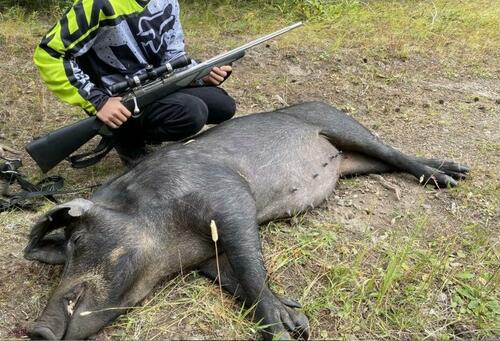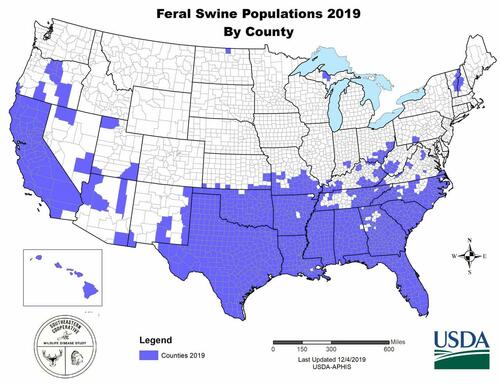
Already beset by wild boars in southern regions, the US is about to be invaded by hordes of "super pigs" set to spill over from their current ranges in Canada and blaze a multifaceted path of destruction across northern states and beyond.
A cross between domestic pigs and European wild boar, these beasts pack a wallop -- the largest "super pig" killed so far was well over 600 pounds -- and scientists say they're highly intelligent too.

Feral hogs already unleash economic damages of about $1.5 billion a year in the United States, and with this imminent gift from our Canadian neighbors, that toll's growth is set to accelerate. The pigs bring destruction in a variety of ways: devouring crops, uprooting trees, contaminating water, and carrying viruses that can leap into human populations.
Typically three feet tall and five feet long, "these pigs are easily the worst invasive large mammal on the planet," the University of Saskatchewan's Ryan Brook tells Fox News.
“Wild hogs feed on anything. They gobble up tons and tons of goslings and ducklings in the spring. They can take down a whitetail deer, even an adult," Brook told Field & Stream. "Originally, it was like ‘wow, this is something we can hunt.’ But it’s become clear that they’re threatening our whitetail deer, elk, and especially, waterfowl."
“The only people who should be worried about this is anyone who lives in North America and eats meat, or eats vegetables, or eats any foods based on grain crops, or spends time outside for any reason,” said Brook, who heads the university's Canadian Wild Pig Research Project and whom a colleague christened "Chairman of the Boar."

The disaster started when Canadians imported European wild boars in the 1980s to add another agricultural dimension, mating them with domestic pigs to create bigger pigs. After the market for wild boar topped out in 2001, many ranchers simply let them loose into the wild, confident they stood no chance against winter in the Great White North.
However, the brainy beasts -- whose DNA goes back to Siberia -- quickly figured out how to make deep snow caves, even lining the bottoms with cattails scythed with their sharp tusks. "They’re so warm inside that one of the ways we use to find these pigs is to fly first thing in the morning when it’s really cold, colder than -30, and you will actually see steam just pouring out the top of the snow,” Brook told The Guardian.
Now, they're evening constructing above-ground residences that experts like to call "pigloos."
This latest plague upon the United States is likely to be permanent. On the plus side, people in northern states can start enjoying this exhilarating form of hunting -- which has the additional leftist-aggravating benefit of leaning heavy on fossil fuels and semi-automatic rifles:
Already beset by wild boars in southern regions, the US is about to be invaded by hordes of “super pigs” set to spill over from their current ranges in Canada and blaze a multifaceted path of destruction across northern states and beyond.
A cross between domestic pigs and European wild boar, these beasts pack a wallop — the largest “super pig” killed so far was well over 600 pounds — and scientists say they’re highly intelligent too.

Feral hogs already unleash economic damages of about $1.5 billion a year in the United States, and with this imminent gift from our Canadian neighbors, that toll’s growth is set to accelerate. The pigs bring destruction in a variety of ways: devouring crops, uprooting trees, contaminating water, and carrying viruses that can leap into human populations.
Typically three feet tall and five feet long, “these pigs are easily the worst invasive large mammal on the planet,” the University of Saskatchewan’s Ryan Brook tells Fox News.
“Wild hogs feed on anything. They gobble up tons and tons of goslings and ducklings in the spring. They can take down a whitetail deer, even an adult,” Brook told Field & Stream. “Originally, it was like ‘wow, this is something we can hunt.’ But it’s become clear that they’re threatening our whitetail deer, elk, and especially, waterfowl.”
“The only people who should be worried about this is anyone who lives in North America and eats meat, or eats vegetables, or eats any foods based on grain crops, or spends time outside for any reason,” said Brook, who heads the university’s Canadian Wild Pig Research Project and whom a colleague christened “Chairman of the Boar.”

The disaster started when Canadians imported European wild boars in the 1980s to add another agricultural dimension, mating them with domestic pigs to create bigger pigs. After the market for wild boar topped out in 2001, many ranchers simply let them loose into the wild, confident they stood no chance against winter in the Great White North.
However, the brainy beasts — whose DNA goes back to Siberia — quickly figured out how to make deep snow caves, even lining the bottoms with cattails scythed with their sharp tusks. “They’re so warm inside that one of the ways we use to find these pigs is to fly first thing in the morning when it’s really cold, colder than -30, and you will actually see steam just pouring out the top of the snow,” Brook told The Guardian.
Now, they’re evening constructing above-ground residences that experts like to call “pigloos.”
This latest plague upon the United States is likely to be permanent. On the plus side, people in northern states can start enjoying this exhilarating form of hunting — which has the additional leftist-aggravating benefit of leaning heavy on fossil fuels and semi-automatic rifles:
[embedded content]
Loading…





